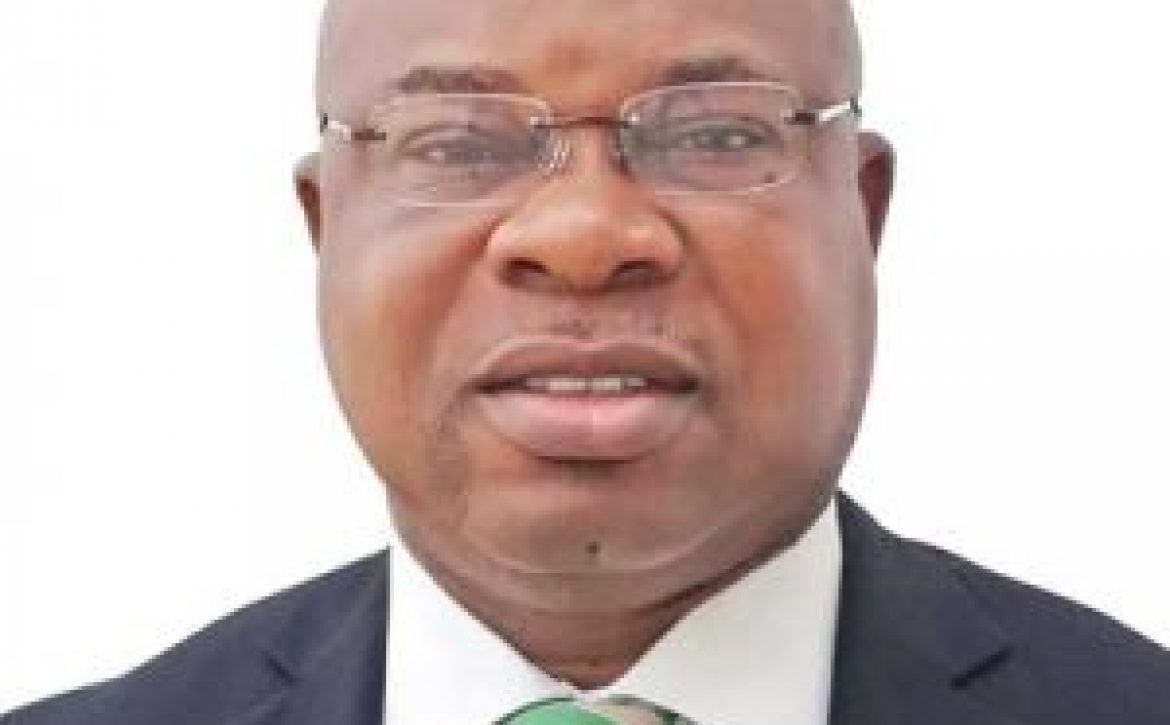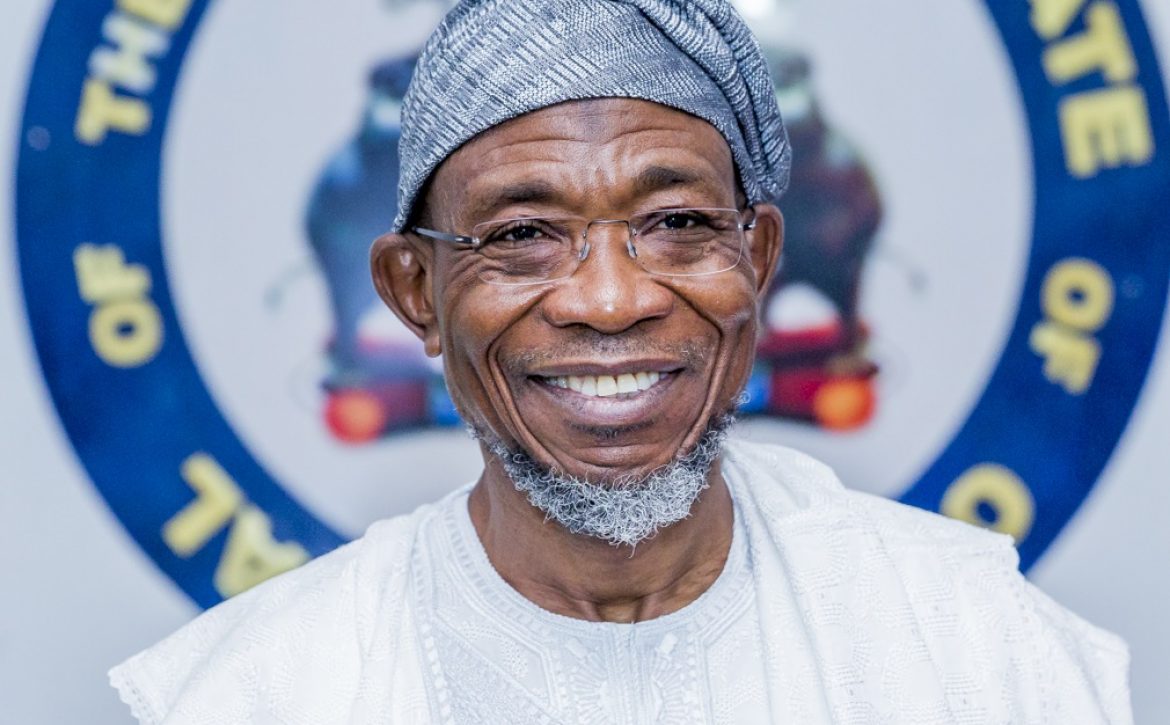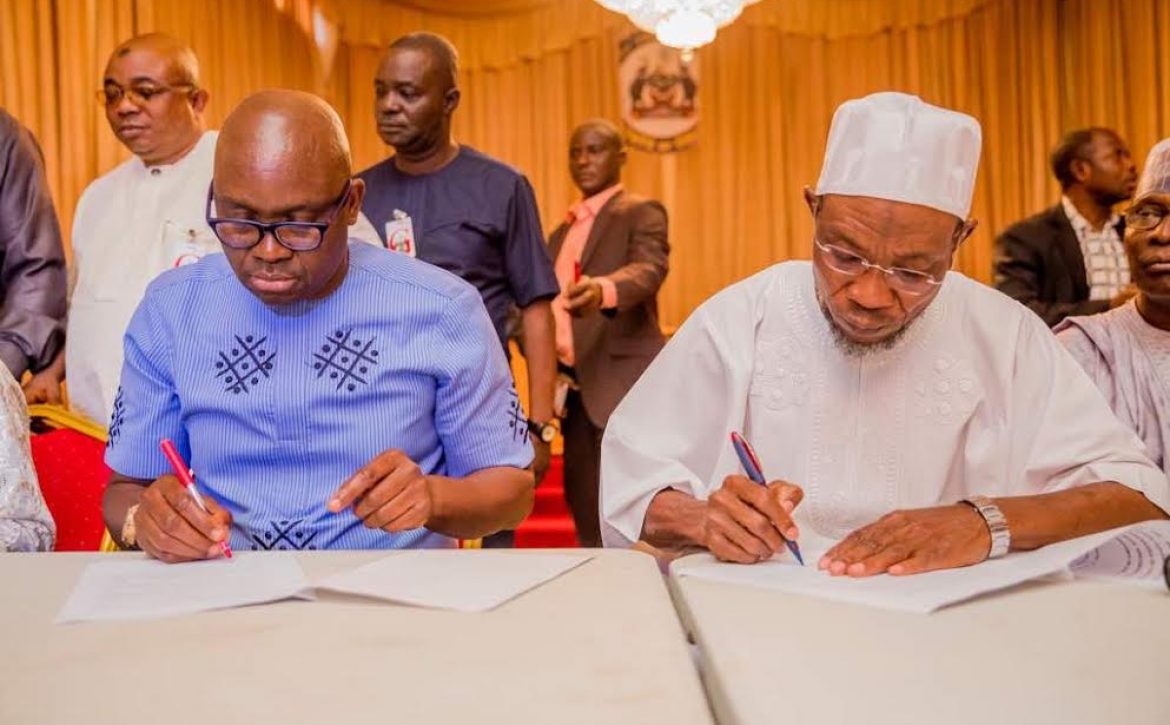The election into the Local Community Development Council was today conducted across the State. The exercise was held at the headquarters of Local Governments, Local Council Development Areas, Area Offices and Administrative Offices.
Among the posts contested for were Chairman, Vice – Chairman, General Secretary, Assistant General Secretary, Treasurer and Financial Secretary. Others were Public Relations Officer, Auditor, Women Representative and Project Coordinator.
The election was largely successful except at Ife South West Local Council Development Area, Awolowo Town where the election was postponed because of irregularities observed in the conduct of the election.
The Senior Special Assistant to the Governor on Rural and Community Affairs, Engineer Moshood Titilola ,who observed the conduct of election in Boripe, Boluwaduro, Ila and Ifelodun Local Governments commended the contestants and the delegates for their peaceful conduct during the election.
Engineer Titilola assured the people of the state that the present government will continue to work for communal peace and security saying people of the State must continue to support the government in achieving this aim.
The Director of Community Development Department in the State, Mrs Hannah Mosadomi explained that the government put in place the necessary materials to ensure the success of the exercise. She added that the election into Zonal Offices will take place next week Wednesday.
Category: Politics
All is now set in the State of Osun to shore up its IGR to a benchmark of N2b monthly.

The newly appointed Special Adviser (SA) to the Governor on Tax Matters, Barrister Jimoh Oluwagbenga Akano, made this known while addressing pressmen immediately after the meeting held with the staff of Osun Internal Revenue Service (OIRS) at the Ministry of Finance Hall.
Barrister Akano stated that, N2b is a benchmark to go with and this is achievable monthly with the survey done so far on IGR of the State.
He therefore called on all heads of departments and units under the Agency to re-double their efforts in making sure that, all the potential tax payers in the State are brought into the tax net.
He equally enjoined all the people of the state, especially tax payers to see tax payment as a clarion call for every taxable adult to obey.
The Honourable Commissioner for Finance, Mr. Bola Oyebamiji has lauded the Executive of the Nigerian Union of Local Government Employees (NULGE) for their support to the present administration.

Mr. Oyebamiji made this charge while addressing the Executive members of NULGE who paid him a courtesy visit in his office.
Finance Commissioner explained that, Ogbeni Rauf Aregbesola appreciated the role played by the NULGE especially when the State was in financial constraint.
Mr Oyebamiji therefore solicited more support and promised better treatment for NULGE and all civil servants in the State as soon as things improve.
Earlier, the President, Nigerian Union of Local Government Employees, State of Osun, Comrade Adeyeye Jacob congratulated Mr. Bola Oyebamiji on his appointment as Commissioner for Finance. He said his quietness, calm, hardwork and trust earned him the appointment. He prayed for his resounding success in office.
He equally promised more support to the government with a view to improving the welfare of NULGE members.
The State Commissioner for Information and Strategy in the State of Osun, Hon. Adelani Baderinwa,has called on all civil servants to cooperate and fully support the present administration in the state.

The Commissioner for Information and Strategy made call today while holding a meeting with the management staff of the Ministry of Information, Home Affairs, Tourism and Culture.
Hon.Baderinwa pointed out that the present political appointees are on call to serve the people. He then stressed that political appointees and civil servants are co-owners of government project and business hence the necessity to work together in harmony in order to gradually solve societal problems and achieve remarkable results.
While assuring that the present administration and the political appointees have limited time and want to leave legacies that would impact positively on the people, he then enjoined the management staff and indeed all government workers to think outside the box by initiating good ideas for government to come out with as policies and work conscientiously to achieve results.
Speaking earlier, the Coordinating Director in the State Ministry of Information, Home Affairs, Tourism and Culture, Mrs Femi Webster-Esho assured the two commissioners of the loyalty and full cooperation of the management and the entire workforce to the present administration in the state.
The newly appointed Special Adviser to the Governor on Rural and Community Affairs, Mr. Babatunde Ibirogba has assured the people of the State of Osun of more fanciful developmental projects which will bring succor to all and sundry.

He disclosed this while addressing the staff at the Conference Room of Water Resources, Rural and Community Affairs.
He added that the main target of any Government for establishing rural based agencies is to bring the dividends of
democracy to the door steps of the dwellers in rural communities.
According to him, nothing can be done without joining hands together with the work force saying that, Ogbeni Rauf Aregbesola’s administration focuses on rural development in order to banish hunger and restore healthy living.
Hon. Ibirogba added that it is very necessary to work with career officers and for a political office holder to deliver, he / she needs to work on ways to impact positively on the society at large.
While appreciating the Governor for the opportunity accorded to him to serve as a Special Adviser, Hon. Ibirigba solicits the support and total cooperation of the entire staff so as to move the agency forward.
The Governor of Osun, Ogbeni Rauf Aregbesola, on Monday said his government’s concern for a better environmental sanity stemmed from the realization that it is only under a stable environment that the potential of the citizenry can be realised.

Aregbesola, in a statement by the Bureau of Communication and Strategy, stated this on the occasion of the World Environment Day, which comes up every June 5.
The Bureau’s statement signed by its Director, Mr. Semiu Okanlawon, quoted Governor Aregbesola as restating his calls on the people of the state to be much more conscious of their environment and take those proactive steps to mitigate the degree of environmental disasters that the world is now exposed to.
The governor, who recently ordered all government agencies in the state to commence a massive tree planting exercise, was quoted as saying that especially as the threats of climate change gets more real, efforts must be geared towards preventive measures to save the environment.
The statement noted, “Today is the World Environment Day. It is the day set aside by the United Nations to call our attention to the critical issues of environment. This year’s theme: Connecting People to Nature is apt in the sense that we cannot fully appreciate the beauty of the environment if we fail to get closer to it.
“This theme is reminding us of that urgent need to plant trees, maintain the existing ones, discourage deforestation, and eliminate those human activities that contribute to environmental degradations.
“So far, about 123 kilometers of waterways and canals in the state capital and outside the state capital have been dredged to avert flood disasters.
“Of critical note is the massive channelization going on at the Old Garage area of Osogbo where the government is constructing a completely new bridge to put an end to the perennial flood that is peculiar to the area.
“About 2.5 million seedlings have also been planted in the ongoing tree-planting campaigns in the state.”
The statement added that it is worthy of note that the Osun government has perfected its strategy for waste management in such a way that the people are conscious of the need to be more responsible in the handling of wastes generated by them.
Urging the people of Osun to monitor trends across the world for environmental issues, the Bureau said unless this is done, the magnitude of the global worries over the environment would not be fully appreciated.
“It is only when this is done that we can measure our performance and mitigate all possible complications that could compromise our environment,” the statement concluded.
Governor Rauf Aregbesola of Osun on Monday received commendations for his intervention in the face-off between the government of his counterpart in Ekiti, Mr. Ayo Fayose and the body of oil marketers in the state.

The Commissioner for Regional Integration in Osun, Mr. Bola Ilori and an aspirant for the vacant seat of the senator of the Osun West district, Mr. Musiliu Tijani Adekilekun, on Monday described as patriotic and an indication of the interest of the Yoruba and the nation, Aregbesola’s move to end the hostilities between his counterpart and a major stakeholder group in the society.
The three-week old strike embarked upon by the Ekiti oil marketers was suspended on Sunday at the Government House Osogbo, after a peace meeting brokered by the Governor of Osun.
Reacting to the development on Monday, both Ilori and Adekilekun said Aregbesola demonstrated with his intervention that his concern for peace, tranquility and stability of the polity transcends Osun, Yorubaland but the entire country.
In a statement by the Bureau of Communication and Strategy, Office of the Governor, signed by its Director Semiu Okanlawon, both Ilori and Adekilekun were quoted as stating that the timely move was in tandem with the regional integration agenda of the South West governors who desire cooperation for the enhanced growth of the geo-political zone.
Adekilekun, a Buckingham, United Kingdom-based Pharmacist, who sought a ticket into the House of Representatives in the 2015 elections, said Aregbesola’s action is worthy of emulation, adding that lack of peace in any part of Yorubaland should be seen as common headache by all the governors of the South-West.
Adekilekun, an indigene of Ede, who has signified his intention to contest for vacant seat of the Osun West senatorial district, said the governor of Osun has demonstrated how to be a statesman.
“I think Governor Aregbesola himself has put it succinctly when I listened to him saying it would be irresponsible of him to watch as issues as critical to the economy degenerate in Ekiti, a neighbouring state and stand aloof unconcerned. By the time Ondo sees the problem in Oyo and its problem and Lagos sees that if there is no peace in Ogun, Lagos cannot be peaceful, we would have achieved the gains of regional integration which I am aware the governor has been championing.”
The newly sworn in Commissioner for Regional Integration, Mr. Bola Ilori, also said Aregbesola has scored a major plus in his drive for the integration of all the states in the South West.
“This is what we need in this part of the country. Forget the artificial barriers of Geography called states, our people are one and the same. Yoruba people in Akure and Egbado are the same with Yoruba people in Ikorodu and Osogbo. How then must we continue to exist in this artificial compartments as if we are different people. Aregbesola has laid that foundation and he should be commended for it,” Ilori said.
The Osun government has called for a concerted effort to save children from multidimensional challenges facing them.

The state deputy governor, Mrs. Grace Titi Laoye-Tomori, at the celebration of the Children’s Day in Osogbo, said it was necessary to protect the children in the interest of the future of the nation.
According to her, myriads of challenges facing the children including child abuse, sexual exploitation, female genital mutilation and other vices must be fought at all fronts with sincerity.
Laoye-Tomori, who was represented by the Permanent Secretary in the Ministry of Education, Mr. Festus Olajide, advised the children to focus on their education and be good ambassadors of the state.
She also implored parents and guardians to prioritise the education of their children and wards, adding that the Aregbesola administration was committed to building a solid foundation for the children.
Laoye-Tomori commended the teachers for their dedication despite the harsh economy.
The Deputy Inspector General of Police, DIG Foluso Adebanjo, has commended the Governor of Osun, Ogbeni Rauf Aregbesola for his administration’s commitment to the security of lives and property of the citizens and residents of Osun.

Adebanjo, who was accompanied by two Deputy Commissioners of Police in the state for a courtesy call on the Governor at the the Government House in Osogbo commended the efforts of Aregbesola at making the state one of the states with the lowest crime rate in Nigeria.
The visit was part of the DIG’s routine security assessment, evaluation and sensitisation of the officers and men of the State and Zonal Commands of the Nigeria Police Force in the zone on the need to uphold professionalism, efficiency and discipline in the course of duty.
The Police boss also lauded Osun Government for giving the Force necessary support and cooperation in its bid to maintaining laws and order.
Describing Osun as one of the states with lowest crime rate in Nigeria, Adebanjo said the Force has been monitoring the records of the state in the last few years, saying, apart from the atmosphere of peace, the state is witnessing massive development of infrastructure.
He therefore sought for executive support to enhance policing and as well free the state and Nigeria from crime and criminality.
According to him, “Nigeria Police Force is always in support of development. We have seen the developmental strides of Governor Aregbesola’s administration in the state of Osun.
“Let me add to it, Osun has one of the lowest crime rates in Nigeria. We cherish this feat and we know that the tempo would be sustained.
“We have been monitoring events in the state even from Abuja and we know that the state has never relent in its efforts of security consciousness.
“As part of our visit is to appreciate Mr. Governor for being supportive of officers and men of the command just we as we equally commend the good people of Osun for their spirit of cooperation openly demonstrated to Police in the state.
“On our part, we shall continue to live up to expectation of Nigerian people in ensuring a safe atmosphere for all to live. We will not rest on our oars to ensure that our nation is free from crimes of all nature”,.
In his response, Ogbeni Rauf Aregbesola advocated for the decentralisation of Police through a proper restructuring and reform to ensure effective zonal management, control and operation of the Police organisation in Nigeria.
He said Nigeria has grown beyond a centralised policing, saying the devolution of power must be encouraged in the Nigeria Police Force to strengthen the sector for greater productivity.
He said the restructuring of the police and the devolution of its control would go a long way to foster improvement in the system, promoting moral integrity and discipline in the affairs of all police officers and men.
Aregbesola held that, since police remains a civil security organisation, the decentralisation of the system will increase the efficiency and proficiency of the Nigeria Police.
Aregbesola asserted that the complexity and diverse nature of policing in Nigeria has become worrisome, a thing which he said requires urgent restructuring to promote effective zonal and state’s control of its administration and management.
According to him, “The essence of human urbanisation and socialisation is security. Therefore, it is a duty not only for government but also the people to support security agencies especially the police.
“Since the first obligation and responsibility of government remains security and maintenance of law and order, therefore, it behoves on any serious government to prioritise and guarantee the security of lives and property of the citizenry.
“So, there can be civil service or public service without adequate security just as development lies on the security status of any society. All the social and physical infrastructures on any society could be measured by the level of security therein.
“This justifies that there wouldn’t be any iota of development in an unrest, unsecured, volatile and troubled society. And whenever one want any tangible development, thus , one must accord respect and support to security agencies especially the police.
“It is a duty to support the police, and it is in view of this that I strongly clamour for a restructuring of the Nigeria Police to enhance effectiveness and raise the standard of dedication and high sense of commitment to professional ethics, values and conducts.
“It is a misnomer in a society like Nigeria for Commissioner of Police in a state to be directly answerable to Inspector General of Police in spite the fact that there is zonal Assistant Inspector General of Police in the zone to which such state emanates.
“Ideally, CP should be answerable to zonal commander (AIG), while it the duty of AIG to be responsible to IG. This would sanitise the system and instill the spirit of commitment and dedication into the system.
“There is need to federate Police Force. Police must restructure its structure in such a way that would enhance effective zonal structure and management.
“We need to make Zonal Command effective and this can only be achieved through restructuring.
“I am a strong advocate of federalisation of Police Force. We need to devolve the control of Police in such a way that the cumbersome shouldered by the Inspector General of Police would be reduced.
“So, it is high time we go back to drawing board and map out policies that would strengthen high sense of professionalism, effectiveness and proficiency in the Police Force because the unitary structure has become obsolete to a nation like Nigeria”, Aregbesola stressed
The Governor of Osun, Ogbeni Rauf Aregbesola on Sunday succeeded in breaking the ice of hostilities between his Ekiti State counterpart, Ayo Fayose and oil marketers who had been at loggerheads over the siting of some filling stations in the state.

The Ekiti State Governor commended the swift intervention of the Governor of Osun in resolving the lingering crisis which had led to acute scarcity of oil products in the state.
The truce reached on the intervention of Aregbesola led to the end of the three week old industrial action embarked upon by the Nigeria Union of Petroleum and Natural Gas Workers (NUPENG).
NUPENG suspended the strike with immediate effect.
Fayose, in his remarks shortly after the communique was read and signed by parties involved, said the purpose of coming down to Osun to resolve the matter was to let the world know that the Yoruba nation can take care of its affairs.
He said the existing unity among the Yoruba has got to the extent that issues can be resolved in any part of the region be it Osun, Ekiti, Oyo, Ogun, Ondo and Lagos states.
Fayose said the idea was to further strengthen the existing unity and love among the leadership of the region regardless of political ideology.
According to him, resolving the matter in Osun was a clear demonstration that Yoruba people are one.
“I appreciate Governor Rauf Aregbesola of Osun for this peace process that we have been able to achieve.
“The government and the people of Ekiti state highly appreciate the swift intervention of Osun state government led by Governor Aregbesola.
“This is a manifestation of the spirit of togetherness, love, unity and harmony among the people of this region.
“This is done in the spirit of understanding of Yoruba nation as being demonstrated today that we are one nation and indivisible entity.
“What happened today shows that we have the capacity to resolve issues as states in the region without any external intervention.
“Some people will ask why the Ekiti state government has come to Osun to resolve the matter. But whether is Osun or Ekiti, what is important is that we have resolved the matter and reached a common ground.
“It shows that Yoruba people are one and as well remain indivisible.
“All parties involved have signed a communique and we are going to respect all what is in the communique and we will by the communique just as the committee will be given free hands to work to give a lasting solution to forestall such crisis in the future,” He said.
While reading the communique, the General Secretary, NUPENG Mr. Joseph Ogbebor said the union agreed to suspend the three week strike having reached a common ground with the state government.
Ogbebor reiterated that the two parties have agreed to set up an ad-hoc committee which will after the suspension of the strike oversee the need to find a lasting solution to the crisis.
The communique reads in part: “An ad hoc committee be constituted to fashion out in clear terms the conditions and guidelines for the establishment and operations of filling stations in Ekiti State.
“The committee comprising representatives of Ekiti State Government and oil and gas stakeholders shall commence work on Wednesday 7th June, 2017
“In the spirit of reconciliation, Ekiti State Government agreed to pleas for reversal of the revocation of some Certificates of Occupancy of landed properties on which filling stations are built, except the ones on waterways, canals and where there is no justification for such revocation;
“In that same spirit, the government agreed to stop further demolitions pending the outcome of the committee’s report.
“Consequently, the Nigerian Union of Petroleum and Natural Gas Workers (NUPENG), Independent Petroleum Marketers Association of Nigeria (IPMAN) and other related oil and gas unions hereby suspend the industrial action embarked upon by their members, with immediate effect.
The communique was Signed by: Ekiti State Governor, Dr. Peter Ayodele Fayose, his Osun State counterparts, Ogbeni Rauf Aregbesola,
NUPENG General Secretary, Joseph Ogbebor,
IPMAN Zonal Chairman, Alhaji Debo Ahmed
PTD NUPENG, National Vice Chairman, Comrade Solomon Kilanko
In his remarks, Governor of Osun, Ogbeni Rauf Aregbesola commended the maturity of the leadership of NUPENG and IPMAN exhibited in resolving the crisis between them and the government of Ekiti state.
He expressed profound gratitude and high sense of understanding displayed by the leadership of the Ekiti state oil marketers, saying it has shown that dialogue remains the best method of resolving conflict.
Aregbesola added, “Since this matter has been resolved, I am happy that this brings a permanent peaceful coexistence between the two parties in the state.
“It is believed that this resolution will bring an everlasting and evergreen cordial relationship between and the unions.”








